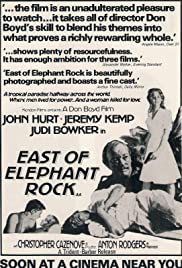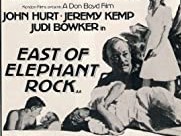East of Elephant Rock *** (1976, John Hurt, Jeremy Kemp, Judi Bowker, Christopher Cazenove, Anton Rodgers) – Classic Movie Review 10,774
Writer-producer-director Don Boyd’s 1976 British independent drama film East of Elephant Rock is his second feature following the 1975 Intimate Reflections, with his screenplay based on a treatment by journalists Richard Boyle and James Atherton, in turn based on the 1911 Ethel Proudlock murder case in Kuala Lumpur, Malaysia. This is the same sensational real-life cause célèbre story that scandalised British colonial society and prompted William Somerset Maugham’s 1927 play The Letter and two subsequent film adaptations, including the Bette Davis classic The Letter.
It was risky, then, for Boyd to make the film, and he paid the price when a hostile UK press suggested had ‘ripped-off’ William Wyler’s classic, though Boyd responded plausibly that he hadn’t seen Wyler’s film but knew of the Proudlock affair.
The well-cast, stylish 70s actors seem to be relishing the 40s British colonial tale of Robert Proudfoot (Christopher Cazenove)’s wife Eve (Judi Bowker), a jealous mistress, who shoots her philandering civil servant lover, Nash (John Hurt).
The film is set in an unnamed British colony in South East Asia in 1948, where exploitative plantation owner Robert Proudfoot’s spoiled wife Eve (Judi Bowker) has an affair with Embassy secretary Nash (John Hurt), but discovers he already has a native mistress and murders him in a fit of jealous rage. Robert comes to Eve’s rescue, and tries to get her a lighter sentencing for the murder.
Comparisons with the Bette Davis classic The Letter aside, this film shows that there is much pleasure to be derived from the story, intelligent screenplay, the fine performances, beautiful photography by Keith Goddard, music and songs by Peter Skellern, and especially the lovely Sri Lankan scenery. Perhaps its main strength is that it was filmed not in some Hollywood or UK studio, but entirely on location in Sri Lanka and the producers rightly wished to thank the Government of Sri Lanka for their co-operation in the making of the film.
In support, Jeremy Kemp is outstanding as Harry Rawlins, and also in the cast are Anton Rodgers as Mackintosh, Tariq Yunus as Inti, Vajira Cabraal as Sharmani, Sam Poythress as Governor General and Geoffrey Hale as Commissioner.
The film was selected for the 1976 London Film Festival but then it took a year for Boyd to find a distributor. Its first general screening was in January 1978 at the new four-screen Classic on Oxford Street in London.
Judi Bowker grew up in Rhodesia (Zimbabwe) and landed the role after she came to her audition in a colonial outfit of the era. Boyd grew up in Kenya during the Mau Mau rebellion.
Filming took place for four weeks in April and May 1976 on location in Sri Lanka, with post production in London, all a budget of just £100,000.
After its hostile reception, Bryan Forbes came to the film’s defence in a letter to The Times newspaper: ‘At a time when the British film industry desperately needs sympathetic encouragement, it is sad that such a worthy endeavour by a young director should be greeted with such a distorted – and to those who know – unfair reception.’
© Derek Winnert 2021 Classic Movie Review 10,774
Check out more reviews on http://derekwinnert.com



